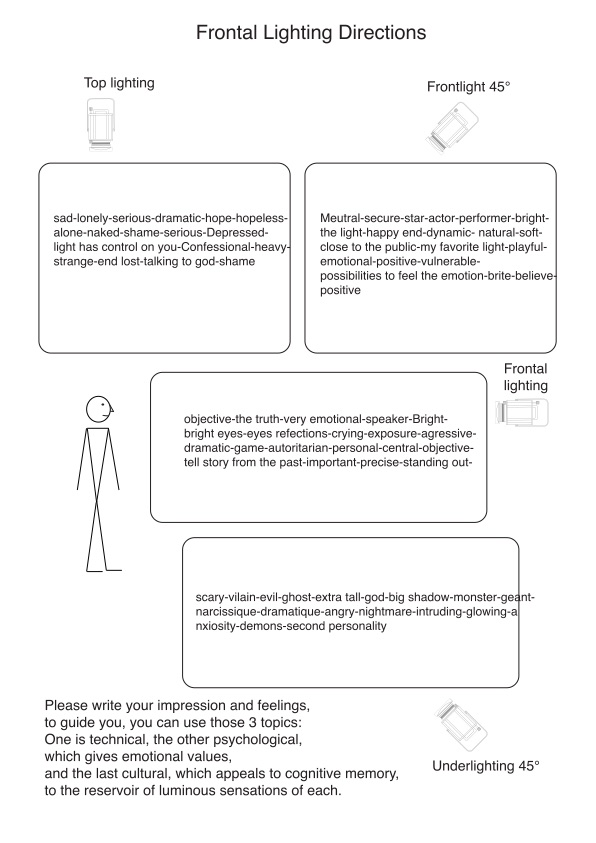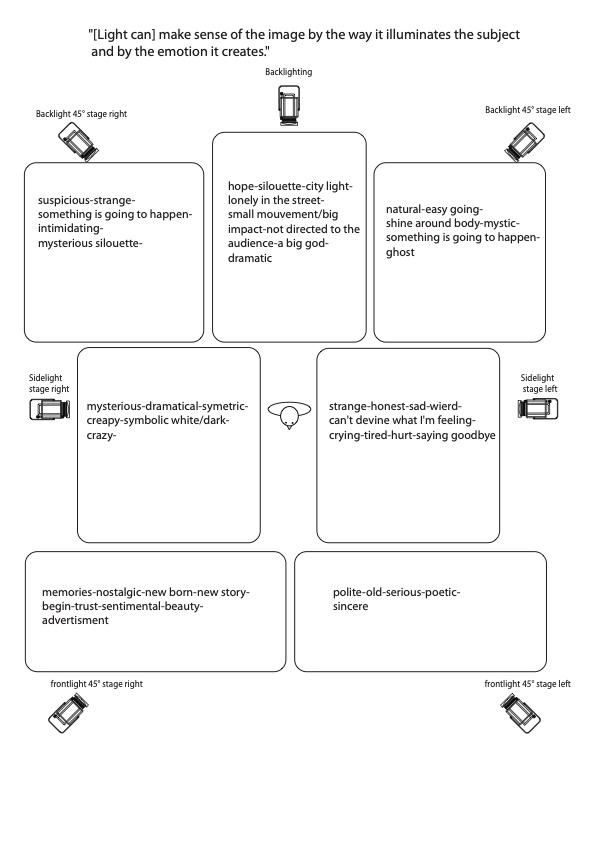The Angle
Introduction :
The angle of the main light is a huge source of meaning. It is this light that defines the direction. Very often there is more lighting to compose an image, to soften it (because a single lamp gives hard shadows), or to detach it from the background of the theater.
Direction :
https://www.matrix.edu.au/film-techniques-lighting/
This website, shows and defined the 4 basic directions and the quality of the light.
Frontal lighting : It is a neutral lighting that diffuses no shadows on the face. You will find it is mostly used for portraits or to emphasise an object or subject.
Sidelight : Sidelight creates a shadow on one half of the subject and sculpts the subject’s features. The contrast between light and shadow creates a sense of mystery
Backlighting : Backlighting creates silhouettes and a glowing effect on the subject. This is used to create a dramatic effect and emphasise the subject in a mysterious way. You may see directors use backlighting to introduce a superior character without revealing their identity.
Underlighting : Underlighting can either be used as a monumental lighting (light up a statue) or distort the subject’s features (ghost stories around the campfire). It creates feelings of fear, curiosity or awe.
Quality of lighting : Hard/harsh lighting :It creates a dramatic and intense atmosphere.
Soft/diffused lighting :It creates a romantic, dreamlike or magical atmosphere.
Link with neuro-cognitive sciences : « psychology of art and the evolution of the conscious brain » by Robert L. Solso.
On the adaptation of semiotics to the framework of theater studies : Martin Esslin as Roland Barthes insist on this aspect: "The architectural setting of a performance, the actors and their actions, the sets, costumes, and lighting are all systems of visual signs that constitute the foundations of any drama. " "Theater is indeed this practice that calculates the looked place of things: if I put the show here, the spectator will see that. "
Very strong, interesting, complicated researche on semiotic by the logician and philosopher Charles Sanders Pierce. A more simple, relevant and interesting way to analyse by : JACQUES LOISELEUX, La Lumière au cinéma, Cahier du cinéma (les Petits Cahiers), SCEREN-CNDP, Paris, 2004, p3. "[Light can] give meaning to the image by the way it illuminates the subject and by the emotion it creates." He speaks of three signifiers of light in cinema: one is technical, the other psychological, which gives emotional values, and the last cultural, which appeals to the cognitive memory, the reservoir of luminous sensations of each. And I think it would be great to research all together on that with this simple and relevant système.
First : a bit of vocabulary to know where we are on stage : Stage Left (Left of the performer from their perspective) Stage Right (Right of the performer from their perspective) Center (same from stage perspective and house perspective) Upstage (the rear of the stage, behind the performer) Downstage (the front of the stage, closest to the audience) Midstage (In between Upstage and Downstage) Onstage and Offstage (used to direct fine adjustments, same from both house and stage positions) House Left (Left from the audience perspective, usually describing something NOT on stage) House Right (Right from the audience perspective, ditto)
FOH (describing the control position and/or house lighting position)
Then, comes the experiment : See the 2 papers with lighting angles written. with somebody saying the same text, we will change the direction of the light and write what we feel.

